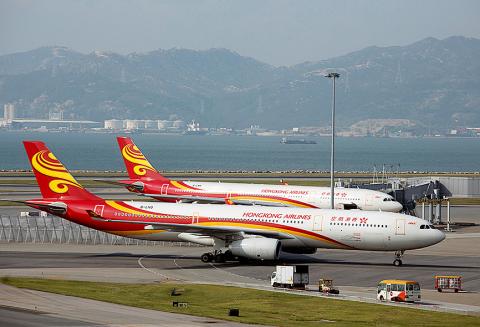Singapore state investor Temasek Holdings has expressed interest in buying into Chinese conglomerate HNA Group Co’s (海航集團) Hong Kong-based carriers, Hong Kong Airlines Ltd (香港航空) and Hong Kong Express Airways (香港快運航空), according to a source familiar with the matter.
However, an investment in the unlisted Hong Kong carriers by Temasek remains subject to a due diligence process that has yet to begin, said the source on condition of anonymity.
The Singaporean investor would likely emerge as only a minority holder in the Hong Kong airlines, which control valuable slots at Hong Kong’s capacity-constrained airport, if a deal is completed, the source said.

Photo: Reuters
Temasek and the debt-laden HNA, an aviation-to-financial services conglomerate, last week signed a memorandum of understanding to explore business partnerships in aviation and logistics.
A second source familiar with the matter said HNA is looking to raise funds for the Hong Kong airlines and Temasek is a potential investor.
Buying into the Hong Kong airlines would help Temasek get an aviation foothold closer to China, in a market dominated by Cathay Pacific Airways Ltd (國泰航空).
Temasek is the majority shareholder in Singapore Airlines Ltd, which sources said was not associated with the potential investment in the Hong Kong airlines.
Temasek, HNA and Singapore Airlines declined to comment.
Hong Kong Airlines and HK Express representatives said their respective airlines would not comment on “market rumors.”
Corrine Png (方華婷), chief executive of Crucial Perspective, a transport research firm, said that Hong Kong Airlines would be valued at about US$1.1 billion and HK Express at about US$300 million.
The pair combined have about a 10 percent market share at Hong Kong International Airport, she said.
The ownership structure and finances of HNA’s Hong Kong airlines are opaque. In January, HNA-controled Hainan Airlines Holding Co (海南航空) said it transferred a 55 percent stake in Hong Kong Airlines to an “independent third party,” Frontier Investment Partner, incorporated in the Cayman Islands.
Hainan Airlines said the deal was structured in July last year to avoid future competition issues with the company’s Chinese carriers.
US filings lodged in 2015 and 2016 show that HNA-linked groups at that time owned 96 percent of Hong Kong Airlines, which in turn held a 66 percent stake in Hong Kong Express, with the bulk of the remaining stake owned by HNA-affiliated groups.
Hong Kong Airlines, which in 2015 dropped plans for an initial public offering, has 37 mostly widebody jets with 24 more on order as it expands into long-haul markets traditionally dominated by Cathay in North America and Europe.
Hong Kong Express has 24 narrowbodies.
Temasek and Singapore Airlines had previously targeted the Chinese market with a planned purchase of a 24 percent stake in China Eastern Airlines Corp (中國東方航空) that was rejected by the Chinese carrier’s shareholders in 2008.
The stake, then worth US$923 million, would now be valued at US$3.4 billion.

CHIP RACE: Three years of overbroad export controls drove foreign competitors to pursue their own AI chips, and ‘cost US taxpayers billions of dollars,’ Nvidia said China has figured out the US strategy for allowing it to buy Nvidia Corp’s H200s and is rejecting the artificial intelligence (AI) chip in favor of domestically developed semiconductors, White House AI adviser David Sacks said, citing news reports. US President Donald Trump on Monday said that he would allow shipments of Nvidia’s H200 chips to China, part of an administration effort backed by Sacks to challenge Chinese tech champions such as Huawei Technologies Co (華為) by bringing US competition to their home market. On Friday, Sacks signaled that he was uncertain about whether that approach would work. “They’re rejecting our chips,” Sacks

Taiwan’s exports soared 56 percent year-on-year to an all-time high of US$64.05 billion last month, propelled by surging global demand for artificial intelligence (AI), high-performance computing and cloud service infrastructure, the Ministry of Finance said yesterday. Department of Statistics Director-General Beatrice Tsai (蔡美娜) called the figure an unexpected upside surprise, citing a wave of technology orders from overseas customers alongside the usual year-end shopping season for technology products. Growth is likely to remain strong this month, she said, projecting a 40 percent to 45 percent expansion on an annual basis. The outperformance could prompt the Directorate-General of Budget, Accounting and

NATIONAL SECURITY: Intel’s testing of ACM tools despite US government control ‘highlights egregious gaps in US technology protection policies,’ a former official said Chipmaker Intel Corp has tested chipmaking tools this year from a toolmaker with deep roots in China and two overseas units that were targeted by US sanctions, according to two sources with direct knowledge of the matter. Intel, which fended off calls for its CEO’s resignation from US President Donald Trump in August over his alleged ties to China, got the tools from ACM Research Inc, a Fremont, California-based producer of chipmaking equipment. Two of ACM’s units, based in Shanghai and South Korea, were among a number of firms barred last year from receiving US technology over claims they have

BARRIERS: Gudeng’s chairman said it was unlikely that the US could replicate Taiwan’s science parks in Arizona, given its strict immigration policies and cultural differences Gudeng Precision Industrial Co (家登), which supplies wafer pods to the world’s major semiconductor firms, yesterday said it is in no rush to set up production in the US due to high costs. The company supplies its customers through a warehouse in Arizona jointly operated by TSS Holdings Ltd (德鑫控股), a joint holding of Gudeng and 17 Taiwanese firms in the semiconductor supply chain, including specialty plastic compounds producer Nytex Composites Co (耐特) and automated material handling system supplier Symtek Automation Asia Co (迅得). While the company has long been exploring the feasibility of setting up production in the US to address